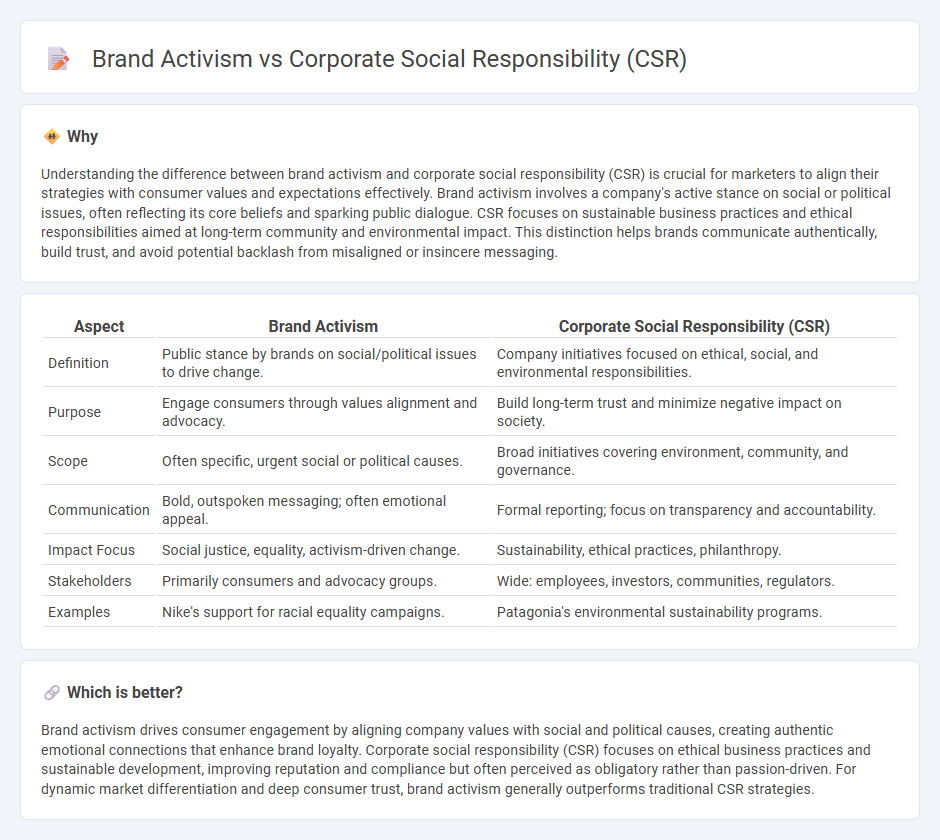
Brand activism involves companies taking a stand on social and political issues to align with their audience's values, while corporate social responsibility (CSR) focuses on ethical practices and contributing positively to society through sustainable business operations. Both strategies enhance brand reputation and consumer trust but differ in scope and approach, with brand activism being more outspoken and purpose-driven. Explore how integrating these approaches can amplify your marketing impact.
Why it is important
Understanding the difference between brand activism and corporate social responsibility (CSR) is crucial for marketers to align their strategies with consumer values and expectations effectively. Brand activism involves a company's active stance on social or political issues, often reflecting its core beliefs and sparking public dialogue. CSR focuses on sustainable business practices and ethical responsibilities aimed at long-term community and environmental impact. This distinction helps brands communicate authentically, build trust, and avoid potential backlash from misaligned or insincere messaging.
Comparison Table
| Aspect | Brand Activism | Corporate Social Responsibility (CSR) |
|---|---|---|
| Definition | Public stance by brands on social/political issues to drive change. | Company initiatives focused on ethical, social, and environmental responsibilities. |
| Purpose | Engage consumers through values alignment and advocacy. | Build long-term trust and minimize negative impact on society. |
| Scope | Often specific, urgent social or political causes. | Broad initiatives covering environment, community, and governance. |
| Communication | Bold, outspoken messaging; often emotional appeal. | Formal reporting; focus on transparency and accountability. |
| Impact Focus | Social justice, equality, activism-driven change. | Sustainability, ethical practices, philanthropy. |
| Stakeholders | Primarily consumers and advocacy groups. | Wide: employees, investors, communities, regulators. |
| Examples | Nike's support for racial equality campaigns. | Patagonia's environmental sustainability programs. |
Which is better?
Brand activism drives consumer engagement by aligning company values with social and political causes, creating authentic emotional connections that enhance brand loyalty. Corporate social responsibility (CSR) focuses on ethical business practices and sustainable development, improving reputation and compliance but often perceived as obligatory rather than passion-driven. For dynamic market differentiation and deep consumer trust, brand activism generally outperforms traditional CSR strategies.
Connection
Brand activism and corporate social responsibility (CSR) intersect through their shared focus on ethical practices and social impact, enhancing brand reputation and consumer trust. Both strategies engage stakeholders by addressing social, environmental, and political issues, positioning companies as purposeful leaders in the marketplace. Effective integration of brand activism with CSR initiatives drives deeper emotional connections with consumers while reinforcing long-term sustainable business values.
Key Terms
Ethics
Corporate social responsibility (CSR) involves companies integrating ethical practices and social concerns into their business operations, emphasizing sustainability, fair labor, and community engagement. Brand activism goes further by actively taking public stances on social and political issues, influencing consumer perception and advocating for societal change. Explore how ethics shape CSR and brand activism to understand their impact on both business integrity and public trust.
Purpose-driven
Purpose-driven initiatives in corporate social responsibility (CSR) focus on integrating social and environmental concerns into business operations and stakeholder interactions, enhancing long-term value and ethical impact. Brand activism, on the other hand, involves companies actively taking public stances on social and political issues to align with consumer values and drive societal change. Explore how leading global brands leverage these strategies to strengthen market position and societal influence.
Stakeholder engagement
Corporate social responsibility (CSR) involves companies integrating social and environmental concerns into their operations to meet stakeholder expectations, emphasizing transparency and long-term value creation. Brand activism goes a step further by actively advocating for social or political issues, fostering deeper emotional connections with stakeholders through bold, purpose-driven messaging. Explore how businesses balance CSR and brand activism to maximize stakeholder engagement and brand loyalty.
Source and External Links
Corporate social responsibility - Wikipedia - Corporate social responsibility (CSR) is a form of international private business self-regulation aimed at contributing to societal goals of a philanthropic, activist, or charitable nature, often through ethical business practices, community support, and partnerships with non-profits.
What Is Corporate Social Responsibility (CSR)? - CSR is a management concept ensuring a company's practices are ethical and beneficial for society, covering issues from human rights to the environment, and is increasingly integrated with environmental, social, and governance (ESG) strategies.
What is Corporate Social Responsibility (CSR)? Guide & Examples - CSR describes a company's voluntary efforts to improve society, such as donating to nonprofits, supporting employee volunteerism, and adopting environmentally or socially responsible business practices, all while strengthening brand reputation and customer trust.
 dowidth.com
dowidth.com